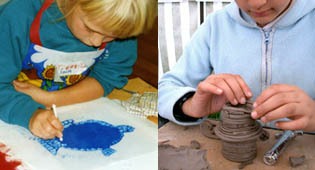











growing concerns
Being ready for the unknown
There is continual discussion on what the future holds for us and how we might prepare for this. The idea of one job or career for life is long gone, and it is clear that the working lives of individuals in our society are likely to change profoundly throughout their lives.
The challenges of over-
A progressive deskilling of practical type of jobs has taken place in western societies especially since companies have outsourced their work to cheaper developing countries. The traditional ‘manual labour’ type jobs are no longer there, leaving parts of society ill prepared for alternative kinds of employment -
What skills and knowledge will today's children need when they grow up? What jobs are disappearing? What skills will future employers want?
One of the consistently growing areas of employment is in the cultural and creative industries, which includes information technology and design, as well as all forms of media and the arts generally. Other areas of growth are largely in the service industries.
Developing an explorative mind capable of imagining and creating new ideas, and developing abilities to communicate fluently are likely to be key criteria to meeting these new challenges.
A fundamental part of education and learning is preparation for a working life -
In their recent report 'Future of Cultural Value' by the Warwick Commission (publ. 2015) investigating the social, economic and artistic value that culture brings to Britain, they highlight recent worrying changes affecting education -
"There are pressures on specialist courses to raise staff-
The report is also critical of the lack of cross curricular co-
"Policymakers are obsessed with a [disjointed] subject-
resource link > Warwick Commission 'Future of Cultural Value'
what do we mean -
• there is special knowledge and understanding to be gained by making things
• childhood plays a vital part in this innovative process
a historical perspective
• observation, trial and error
• origins of maths
• patterns and geometry
facing the future
growing concerns
• Neil MacGregor
• Sherry Turkle
• Seymour Papert